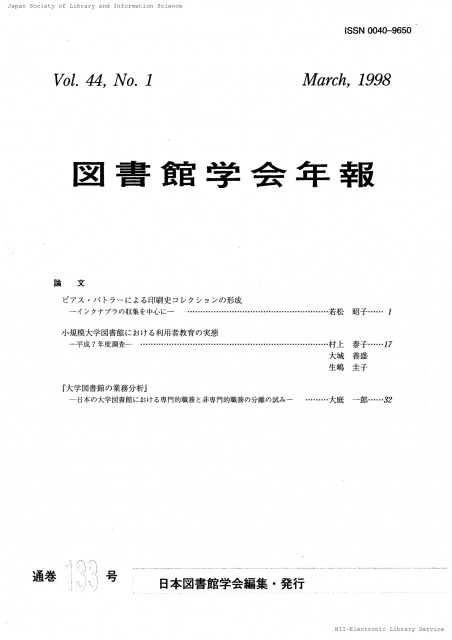Volume 21, Issue 3
Displaying 1-12 of 12 articles from this issue
- |<
- <
- 1
- >
- >|
-
1975Volume 21Issue 3 Pages 121-128
Published: 1975
Released on J-STAGE: October 07, 2022
Download PDF (1129K) -
1975Volume 21Issue 3 Pages 129-137
Published: 1975
Released on J-STAGE: October 07, 2022
Download PDF (1232K) -
1975Volume 21Issue 3 Pages 138-145
Published: 1975
Released on J-STAGE: October 07, 2022
Download PDF (819K) -
1975Volume 21Issue 3 Pages 146-152
Published: 1975
Released on J-STAGE: October 07, 2022
Download PDF (914K)
-
1975Volume 21Issue 3 Pages 153-155
Published: 1975
Released on J-STAGE: October 07, 2022
Download PDF (425K)
-
1975Volume 21Issue 3 Pages 156-158
Published: 1975
Released on J-STAGE: October 07, 2022
Download PDF (489K)
-
1975Volume 21Issue 3 Pages 159-161
Published: 1975
Released on J-STAGE: October 07, 2022
Download PDF (481K)
-
1975Volume 21Issue 3 Pages 162-164
Published: 1975
Released on J-STAGE: October 07, 2022
Download PDF (450K)
-
1975Volume 21Issue 3 Pages 165-166
Published: 1975
Released on J-STAGE: October 07, 2022
Download PDF (269K)
-
1975Volume 21Issue 3 Pages 152
Published: 1975
Released on J-STAGE: October 07, 2022
Download PDF (104K) -
1975Volume 21Issue 3 Pages 166-167
Published: 1975
Released on J-STAGE: October 07, 2022
Download PDF (260K) -
1975Volume 21Issue 3 Pages 167-168
Published: 1975
Released on J-STAGE: October 07, 2022
Download PDF (274K)
- |<
- <
- 1
- >
- >|
